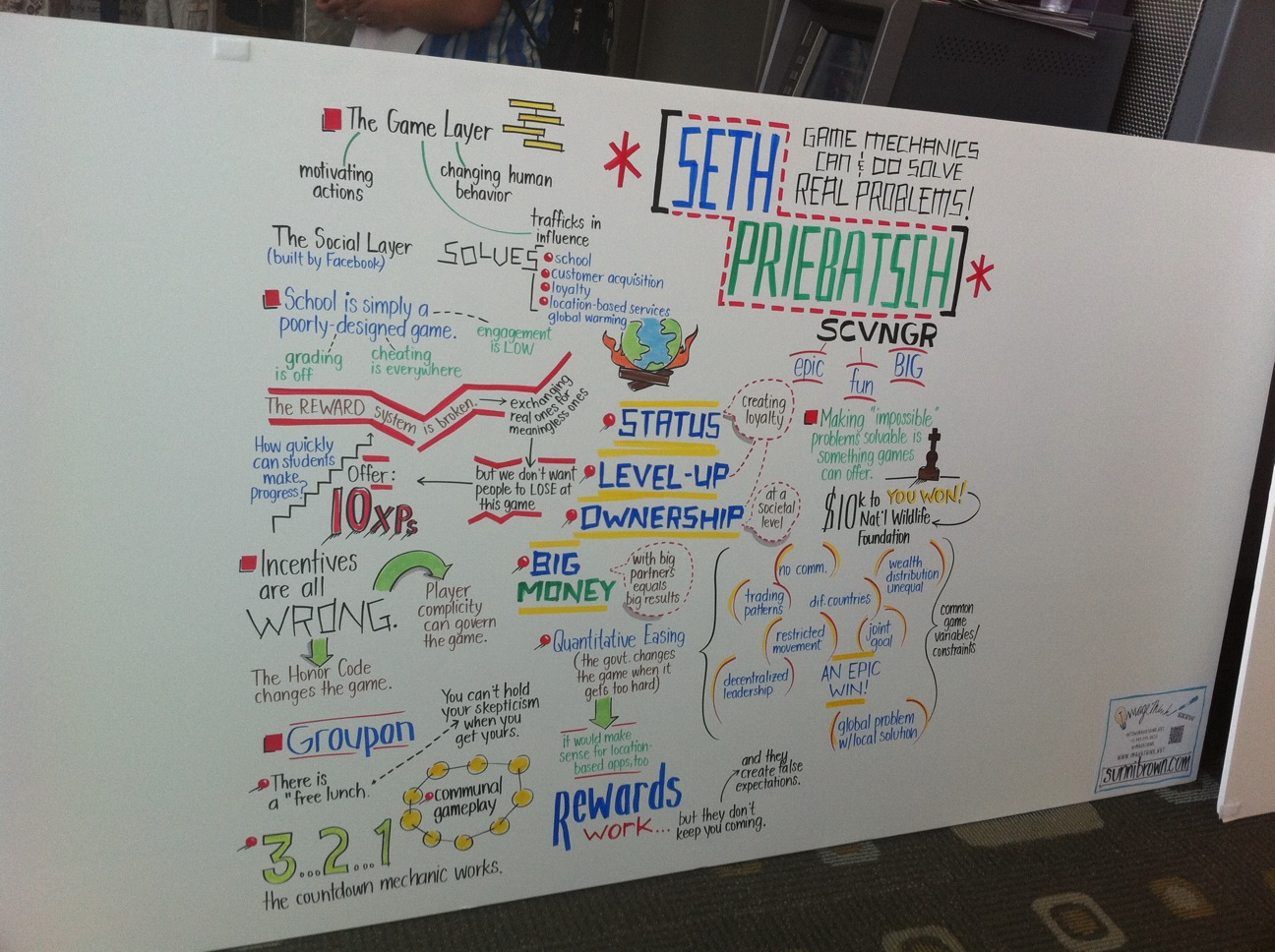
At SXSW Interactive, you're occasionally going to run into this profile: 22-year-old CEO of company, dropped out of Princeton after a year, has given himself the title "Chief Ninja." And, yes, those of us whose corporate backgrounds include pre-Zuckerbergian strata have to resist the urge to eyeroll when faced with such a profile.
And yet, one person with that profile -- SCVNGR's Seth Priebatsch -- delivered a fascinating keynote speech on Day 2 of SXSW 2011 on Saturday afternoon. So fascinating, in fact, that the typically cynical SXSWi crowd, known to tweet that cynicism in a richly-entertaining way that pretty much necessitates using a keynote's Twitter stream as color commentary, was downright bubbly.

While much of the commentary was focused on Priebatsch's youthful exuberance and general marveling over his age and dropout status, the substance of his talk is really what's worth focusing on, because it signals a trend in online engagement that could have widespread market impact.
The keynote, titled "The Game Layer on Top of the World," noted that the past decade of interactive work has been dedicated to building a social network that allows us to connect to one another, and notes that this work is now basically completed. The next decade, in his view, will be dedicated to the game layer, which will build upon that social network, and give us the potential to meet a number of issues head-on -- including issues that have indeed been created by the formation of that social network.
He organized his talk by addressing five core issues and how they fit within the worldview of someone consumed with how games work, why we play games and what elements keep us coming back to games. The issues: school, customer acquisition, loyalty, bringing location-based services (such as Foursquare and Gowalla) to the mainstream, and global warming. (The last one, though obviously big, was a more illustrative than literal point, but revealed at the end of the speech to be not entirely untenable.)
The school section felt the most fleshed-out of all five points, and Priebatsch's views were a fascinating look into our education system from the view of a game designer.
School is, in Priebatsch's view, a nearly-perfect game ecosystem, with motivated players, challenges, time constraints, rules, rewards, and enemies. And yet, he notes that the two problems with school right now are a lack of motivation and engagement in players, and cheating.
To address the cheating issue in particular, Priebatsch looked at his alma mater's adoption of an honor code for exams, designed for students to police themselves and each other -- and noted that the paradigm shift created by the test becoming "the enemy," rather than an instructor or other proctor placed in the enforcer role, dramatically reduced instances of cheating.
Looking at the issue of customer acquisition, and how gaming can help there, Priebatsch looked at the popularity of Groupon, and how it's turned coupon purchasing into a game that a lot of people want to play, by requiring a number of Groupon subscribers to purchase a given day's offering to trigger the discounts.
He sees a trio of essential gaming qualities at work: the free lunch concept (in essence, that you're getting something for participation, but the way Groupon designs it, the numbers of people participating in order to trigger the reward makes us less suspicious of it), communal gameplay (requiring multiple participants working with each other to activate that days' Groupon offering), and a countdown (which introduces the racing-against-time element into the proceedings).
To address the loyalty issue, Priebatsch cited several examples drawing on the concepts of inclusive ownership -- including one of SCVNGR's latest ventures, LevelUp, which takes the basic Groupon model but allows users to achieve higher levels of buy-in in which they'll get more for what they purchase at progressively higher levels. In talking about the ancillary concept of exclusive ownership -- where a customer is made to feel that he or she is solely reaping the rewards of having something -- he drew upon the classic game Risk, which sent little ripples of reverie through much of the room, especially when he drifted into fond recollections of owning Kamchatka.
His look at the issue of mainstreaming location-based services wasn't as fleshed out as the first three. Though the pie chart that showed "people in this room" to be a significant portion of Foursquare and Gowalla users was funny, his querying about the possibility of checking into locations with the intent of being there rather than actually being there didn't seem to address what might really be the core issues around geolocation apps -- people not seeing adequate rewards for broadcasting their location to the rest of the world (or, at least, to those people they've allowed to glimpse that).
The final point -- how gaming solves global warming -- was illustrated with a game involving color-coded cards, requiring the audience to work together to present them in a certain pattern within a specific window of time.
While the game didn't explicitly show how thorny global issues like global warning could specifically be addressed, Priebatsch used the game as an illustration of the geopolitical world as a specific gaming ecosystem with constraints around communication and available resources. And while getting color-coded cards to face a certain way is not exactly analogous to reducing greenhouse gas emissions in developed and developing nations, it did effectively show that there are lessons from games -- and looking at issues with a game designer's perspective -- that go beyond owning and controlling Kamchatka.